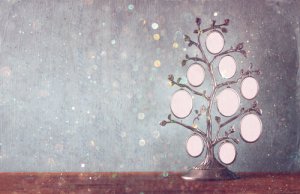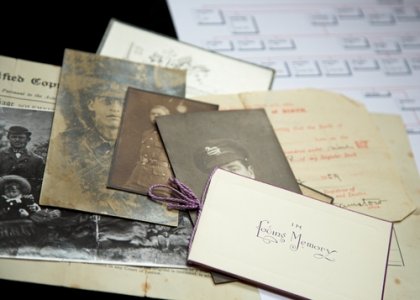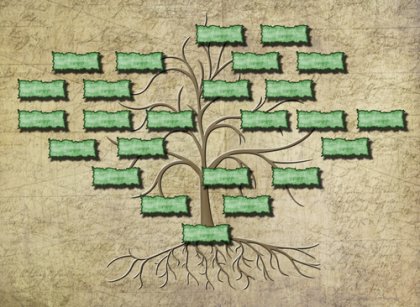The Family Tree: A Tool for Growth and Healing

A family tree is more than just a drawing or a collection of names, dates, and family history. It can be a powerful tool for understanding and healing a person’s circumstances and problems.
Perhaps the family tree is far from being a cure, as some people claim. However, it does give us valuable information about our origin, and explain to some extent where we come from. Some schools of thought even dare to claim that with the family tree we can discover how the family unconscious interacts with the personal unconscious.
“If you don’t know history, then you don’t know anything. You are a leaf that doesn’t know it is part of a tree. ”
-Michael Crichton-
A little history…
In the 60s, a group of psychoanalysts in Europe started using therapies that focused on bringing awareness of the repetition of conflicts and problems in the family. Their therapeutic methods included a transgenerational focus.
In the 70s, “psycho-genealogy” was born. This is a method of psychoanalysis. It highlights the relationship between the root of the person’s problems with unresolved situations of their ancestors. Psycho-genealogy believes that simply being aware of these problems will release or free them. Anne Schutzenberger, Didier Dumas, Jodorowsky, and Bert Hellinger are notable practitioners of psycho-genealogy.
In the last thirty years, the field of psychotherapy started once more to recognize the concept of the “family unconscious.” Psychologists are again considering ancient eastern philosophical ideas. These include the influence that our ancestors can have on our lives. They also include the strength that certain people have on the family network. As a result, experts from multiple disciplines (psychiatry, medicine, social work, education, etc.) use the family tree as part of a patient’s history and as a clinical tool.
“Psycho-genealogy is based on the premise that unconsious behaviors can be transmitted from generation to generation. These behaviors prohibit the self-realization of the individual. For the individual to be aware of these and break the cycle, he has to study his family tree.”

Why make a family tree?
Making a family tree can be a very rewarding activity. It gives you the chance to discover who you are and where you come from. You can research who your ancestors were, their origin, what they did… This activity that is known as genealogy can be a wonderful pastime.
So, researching and producing your own family tree can help you in the following ways:
- It transforms the way you see and understand your family.
- You can work through past grief that you couldn’t process in the moment.
- Learn about your medical history by looking at your ancestor’s illnesses.
- See if your beliefs, fears, and mental blocks are related to family dynamics or trans-generational inheritance.
- Connect with your spirituality. When you know and understand your past, you feel more rooted and connect to something bigger at the same time. Feeling like you are part of a long history makes you more aware of how small you are.
- Access information that you can’t see on a conscious level but keeps manifesting itself on an unconscious level.
“Those who cannot remember the past are condemned to repeat it.”
-George Santayana-
How can you make a family tree?
To make a family tree, start collecting information from family members. Then, look at documents, photos, paintings, vital records offices, periodicals and newspaper archives, the internet, etc.
The information you need to record for your family tree is the following:
- First and last names.
- Important dates: birth, marriage, death, migration…
- Causes or circumstances of death.
- Professions
- What the relationships were like between different family members (rivalries, friendships, privileges…)
- What kind of special qualities your ancestors had.
- Significant events: love stories, anecdotes, debilitating accidents, etc…
- The most important symptoms and illness of the members of your family tree.
“Unexpressed grief, tears not spilled, family secrets, unconscious identifications and invisible family loyalties stroll around in among the children and descendants. What isn’t expressed with words is expressed with pain.”
-Anne Ancelin Schutzenberger-

How to interpret your family tree
Interpreting a family tree means doing a “trans-generational analysis.” With this analysis you can identify unresolved conflicts, grief, behavior patterns… The key issue in interpreting your family tree is to “become aware” and identify possible “programs.” To do that it can be enormously helpful to interpret your family tree with someone else’s help.
“Having a family tree and not studying it is like having a treasure map and not looking for the treasure.”
-Alejandro Jodorowsky-
If you want answers from your family tree, you have to ask a question first. However, often your curiosity will give you the question and the answer at the same time. What usually happens is that someone will make a family tree when they have questions about certain issues (emotions, circumstances, mental blocks, illness, etc…)
In other words, it’s good to analyze your family tree with concrete questions. The work of finding answers and discovering links can be profound and exciting. It is an authentic process of personal development. As a result, the process can help us answer a fundamental question: who are we and how have we been conditioned?
“A person’s roots aren’t physical objects buried in the soil like tree roots. We carry our roots inside of us. They are tentacles that extend through our nerve endings and keep us whole. They go with you where you go, they live with you where you live.”
-Luz Gabas-
In conclusion, studying your family tree can be very exciting. All of us should do it at some point in our lives. According to the experts, simply looking at the family tree and understanding it can be healing. Even more so than whatever we do with the information we find. So, why not give it a try?
“No one exists alone, no one lives alone. We are all who we are because others were who they were.”
A family tree is more than just a drawing or a collection of names, dates, and family history. It can be a powerful tool for understanding and healing a person’s circumstances and problems.
Perhaps the family tree is far from being a cure, as some people claim. However, it does give us valuable information about our origin, and explain to some extent where we come from. Some schools of thought even dare to claim that with the family tree we can discover how the family unconscious interacts with the personal unconscious.
“If you don’t know history, then you don’t know anything. You are a leaf that doesn’t know it is part of a tree. ”
-Michael Crichton-
A little history…
In the 60s, a group of psychoanalysts in Europe started using therapies that focused on bringing awareness of the repetition of conflicts and problems in the family. Their therapeutic methods included a transgenerational focus.
In the 70s, “psycho-genealogy” was born. This is a method of psychoanalysis. It highlights the relationship between the root of the person’s problems with unresolved situations of their ancestors. Psycho-genealogy believes that simply being aware of these problems will release or free them. Anne Schutzenberger, Didier Dumas, Jodorowsky, and Bert Hellinger are notable practitioners of psycho-genealogy.
In the last thirty years, the field of psychotherapy started once more to recognize the concept of the “family unconscious.” Psychologists are again considering ancient eastern philosophical ideas. These include the influence that our ancestors can have on our lives. They also include the strength that certain people have on the family network. As a result, experts from multiple disciplines (psychiatry, medicine, social work, education, etc.) use the family tree as part of a patient’s history and as a clinical tool.
“Psycho-genealogy is based on the premise that unconsious behaviors can be transmitted from generation to generation. These behaviors prohibit the self-realization of the individual. For the individual to be aware of these and break the cycle, he has to study his family tree.”

Why make a family tree?
Making a family tree can be a very rewarding activity. It gives you the chance to discover who you are and where you come from. You can research who your ancestors were, their origin, what they did… This activity that is known as genealogy can be a wonderful pastime.
So, researching and producing your own family tree can help you in the following ways:
- It transforms the way you see and understand your family.
- You can work through past grief that you couldn’t process in the moment.
- Learn about your medical history by looking at your ancestor’s illnesses.
- See if your beliefs, fears, and mental blocks are related to family dynamics or trans-generational inheritance.
- Connect with your spirituality. When you know and understand your past, you feel more rooted and connect to something bigger at the same time. Feeling like you are part of a long history makes you more aware of how small you are.
- Access information that you can’t see on a conscious level but keeps manifesting itself on an unconscious level.
“Those who cannot remember the past are condemned to repeat it.”
-George Santayana-
How can you make a family tree?
To make a family tree, start collecting information from family members. Then, look at documents, photos, paintings, vital records offices, periodicals and newspaper archives, the internet, etc.
The information you need to record for your family tree is the following:
- First and last names.
- Important dates: birth, marriage, death, migration…
- Causes or circumstances of death.
- Professions
- What the relationships were like between different family members (rivalries, friendships, privileges…)
- What kind of special qualities your ancestors had.
- Significant events: love stories, anecdotes, debilitating accidents, etc…
- The most important symptoms and illness of the members of your family tree.
“Unexpressed grief, tears not spilled, family secrets, unconscious identifications and invisible family loyalties stroll around in among the children and descendants. What isn’t expressed with words is expressed with pain.”
-Anne Ancelin Schutzenberger-

How to interpret your family tree
Interpreting a family tree means doing a “trans-generational analysis.” With this analysis you can identify unresolved conflicts, grief, behavior patterns… The key issue in interpreting your family tree is to “become aware” and identify possible “programs.” To do that it can be enormously helpful to interpret your family tree with someone else’s help.
“Having a family tree and not studying it is like having a treasure map and not looking for the treasure.”
-Alejandro Jodorowsky-
If you want answers from your family tree, you have to ask a question first. However, often your curiosity will give you the question and the answer at the same time. What usually happens is that someone will make a family tree when they have questions about certain issues (emotions, circumstances, mental blocks, illness, etc…)
In other words, it’s good to analyze your family tree with concrete questions. The work of finding answers and discovering links can be profound and exciting. It is an authentic process of personal development. As a result, the process can help us answer a fundamental question: who are we and how have we been conditioned?
“A person’s roots aren’t physical objects buried in the soil like tree roots. We carry our roots inside of us. They are tentacles that extend through our nerve endings and keep us whole. They go with you where you go, they live with you where you live.”
-Luz Gabas-
In conclusion, studying your family tree can be very exciting. All of us should do it at some point in our lives. According to the experts, simply looking at the family tree and understanding it can be healing. Even more so than whatever we do with the information we find. So, why not give it a try?
“No one exists alone, no one lives alone. We are all who we are because others were who they were.”
This text is provided for informational purposes only and does not replace consultation with a professional. If in doubt, consult your specialist.







